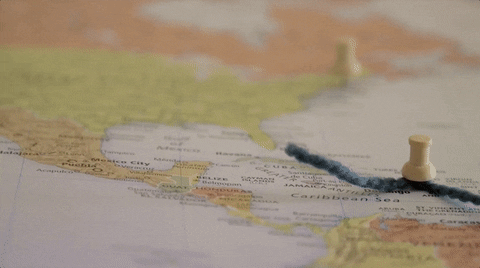
She encourages her readers to struggle with what they know, and where they know from- Katherine McKittrick on Silvia Wynter
When did I first come to learn geography as a way of knowing? Not in school... long before that. As I reflect on Katherine McKittrick's work in Demonic Grounds: Black Women and the Cartographies of Struggle, I've been tasking myself with considering the spaces I first learned to orient myself to land. That would be my childhood home.
Across from my childhood home there was about 10 acres of woods. It spanned from the end of our county road to the next intersection beside our house. In width, the trees grew all the way to the edge of the next street over. Up until about age 9/10, we played in those woods whenever we wanted—until the owner of the property decided he wanted to sell. I remember my dad trying to buy the land and the owner refusing. Instead the land was divided into 6-7 units. The trees were cleared, new people moved in. I was so angry. We’d never really had neighbors. In fact, all the neighbors we did have were relatives.

I could no longer run freely anywhere around the neighborhood. I grew up resentful of these neighbors and the trees which had been cleared. My community before was all family, there was privacy in my front yard. Even though I was a child—with little understanding of deeds, property lines, taxes, or land rights—I felt like the land was mine. This is how most of the kids I grew up with felt about their parent’s farmland as well. I grew up in the same home my whole life. My father grew up next door. This is what home was.

The map I drew above is how I’ve always oriented my home. It is the story I tell anytime someone asks about my childhood or where I grew up. Sometimes it is nostalgic (what a quaint farming community I lived in), sometimes it is more suffocated (see! I had to go, look how my dad’s family never left—I can’t be like that!) … but it rarely calls into question white subjectivity. This map does not question why so many white people in my hometown claim roots to the land while most Black families live in the same set of apartment complexes. This map does not question the history of indigenous people, or how the land was taken and turned into farmland. This map does not question colonialism at all.
My knowledge of geography and my understanding of land has always come from a place of “mine.”
When the land across from my house was sold, divided, and cleared—I felt a disruption of that idea: of how, “geography is not…secure and unwavering” (McKittrick)… however I still was understanding these ideas through a capitalist lens… Why wouldn’t they just sell that land to my dad so we could keep it? I was angry, not for the land- but for myself—because I could no longer use the land, keep the land, and preserve it for my joy. It was the same way I felt when a pipeline project forced my parents to clear out another section of woods from our property (the area on the left of the map). When I came home from college one weekend and all the trees had been cleared by bulldozers. Was I sad for the land? No, I was sad for me.
I cannot help but keep coming back to these ideas, because I wanted to consider my own orientations to geography… my understanding of land. Obviously, I was exposed to Western maps throughout grade school (which I now know to be physically incorrect scale wise), but I was also exposed to an orientation of place through ownership and inhabitant. What does it say that the way I map my childhood is through the placement of houses and that the spaces in between I’ve always simply thought of as “woods I played in” … as if they were not home, biologically, to many other creatures and species?
“This cartographic abstraction corresponded with claims to sovereignty, and the lands were perceived as legitimately appropriable in the name of the (Spanish, European) state.” If prevailing geographic distributions and interactions are racially, sexually and economically hierarchical, these hierarchies are naturalized by repetitively spatializing "difference." McKinntrick
Why is it because the land across our street was empty- I thought I was entitled to them? So much so, that I resented the people who moved in? I was already creating hierarchies of us/them, mine/theirs, community/outsiders.
